Millions of soccer fans around the world have been waiting four years for the 2014 World Cup, which begins on Thursday.
IF YOU DON'T KNOW A TON ABOUT THE SPORT, THIS IS FOR YOU
Millions of American sports fans, however — who have been spending that time watching (American) football, basketball, and baseball — will tune in and be a little confused.
Soccer's definitely becoming more popular in the US, but it's still not quite mainstream. Though there are lots of hardcore American soccer fans, there are many more that will watch the World Cup this summer but don't know a ton about the sport and might be unaware of some of the Beautiful Game's finer points.
If you fall into this latter group, this piece is for you. Here's what you need to know to fake it as a legit soccer fan for the 2014 World Cup.
1. The World Cup is the pinnacle of soccer
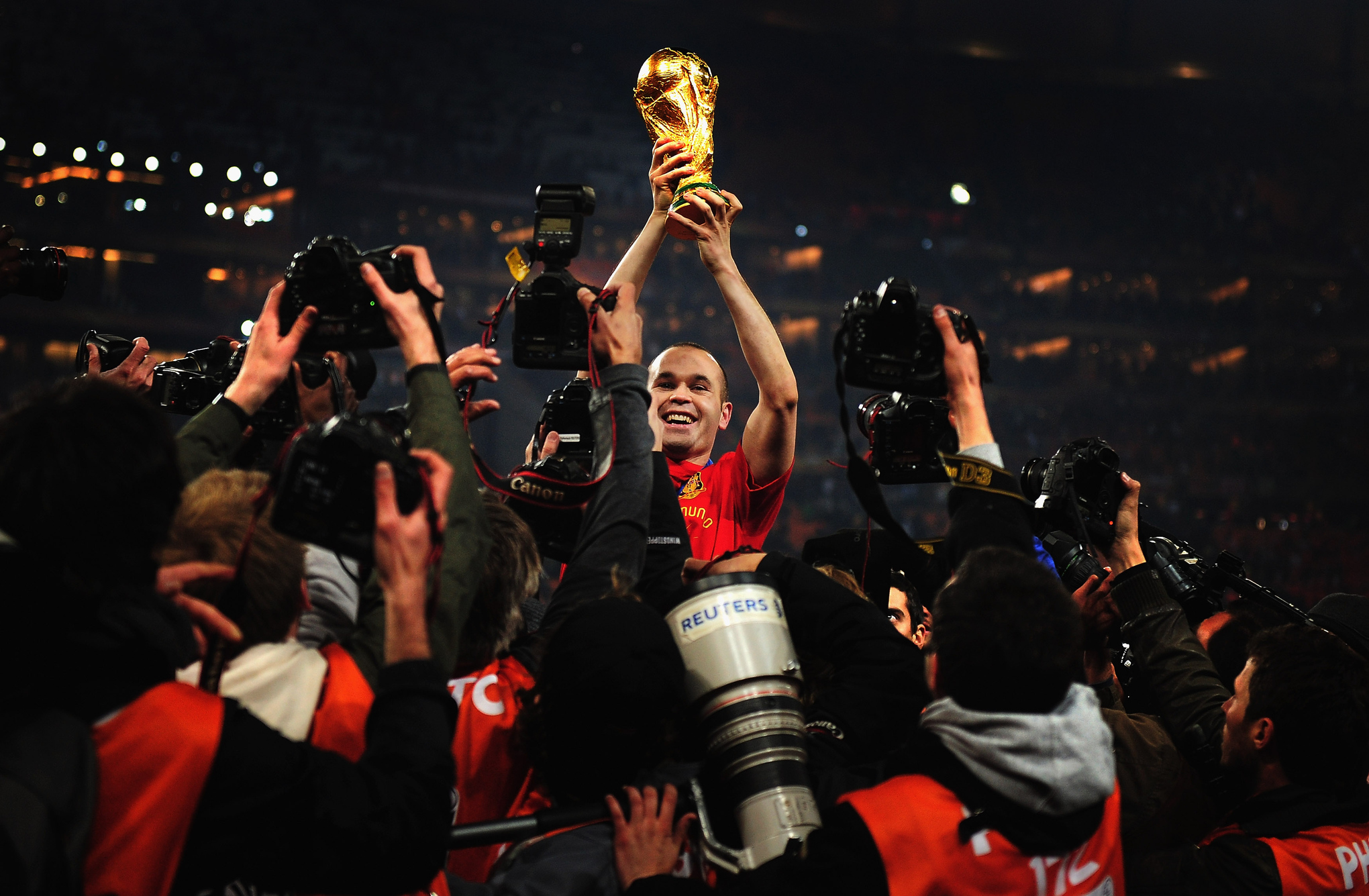
Andres Iniesta holds the trophy after Spain wins the 2010 World Cup. Clive Mason/Getty Images
The world's top soccer players spend most of their time playing for privately-owned teams that represent cities in country-specific leagues — like Manchester United or Real Madrid — in a system that roughly parallels American pro sports.
IT'S AS IF OLYMPIC HOCKEY MATTERED MORE THAN THE STANLEY CUP
But elite players also spend some of their time playing for their home countries' national teams as part of the World Cup, organized by FIFA (theFédération Internationale de Football Association). Unlike American sports, these matches are considered the pinnacle of the sport — not in terms of quality of play, but in terms of the importance assigned to it.
FIFA claims half of humanity tuned into one match or another during the last World Cup. It's as if Olympic hockey mattered more than the Stanley Cup, or the World Baseball Classic was more important than the (poorly named) World Series.
We're about to start the World Cup finals, which take place every four years. 32 national teams compete in a tournament held in one country over the course of about a month, with billions of people watching worldwide. The last one, in 2010, was held in South Africa, and Spain won.
But in between each of these tournaments, there are hundreds of qualifying matches that winnow the field down from 209 national teams to the 32 that make the final tournament.
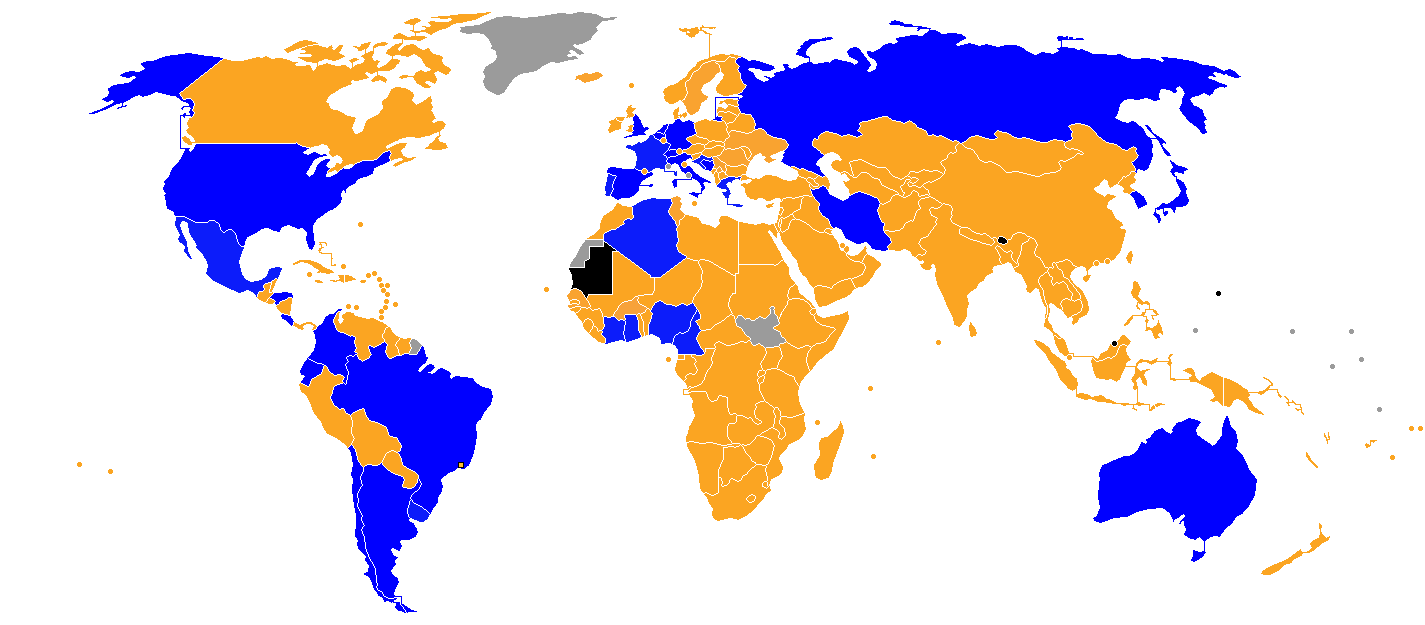
The 32 blue countries have teams in the World Cup finals. Yellow countries do not. (Black countries didn't enter teams, and grey ones aren't FIFA members.) Wikimedia commons
Last December, the 32 teams that made it into this years' finals were arranged into eight groups of four that are supposedly of even quality, based on a combination of rankings, geography, and random chance.
2. The World Cup finals are a multi-stage tournament
The month-long tournament is divided into two stages. First, as part of the group stage, each team plays the three other countries in its group.
IN THE GROUP STAGE, EACH TEAM PLAYS THE OTHER THREE IN ITS GROUP
For example, the US was in Group G, with Ghana, Portugal, and Germany. They played each of these teams once (on June 16, 22, and 26, respectively), and the three other teams played each other once as well.
In this stage, a win counts for three points, a draw counts for one point, and a loss is zero points. When all these matches finished on June 26, the two teams with the most points from each group advanced. In Group G, that was Germany and the US.
On June 28, the winning 16 teams will enter a single-elimination tournament, called the knockout stage. It works pretty much like the NCAA tournament — 16 teams get cut down to 8, then 4, then 2 teams as each round progresses. There are no draws: tie matches are followed by extra time (i.e. overtime), then if they're still tied, by a shootout. The championship will be on July 13.
Update: Fourteen teams (Ghana, Portugal, Spain, Ecuador, Honduras, England, Australia, Bosnia, Croatia, Italy, Cameroon, Japan, Iran, and the Ivory Coast) have been eliminated. Fifteen teams (Germany, the US, Brazil, France, Mexico, the Netherlands, Chile, Costa Rica, Uruguay, Switzerland, Argentina, Nigeria, Belgium, Columbia, and Greece) have clinched spots in the knockout stage. Algeria, Russia, and South Korea are battling for the final spot.
3. The US team was in the "group of death" — but made it out
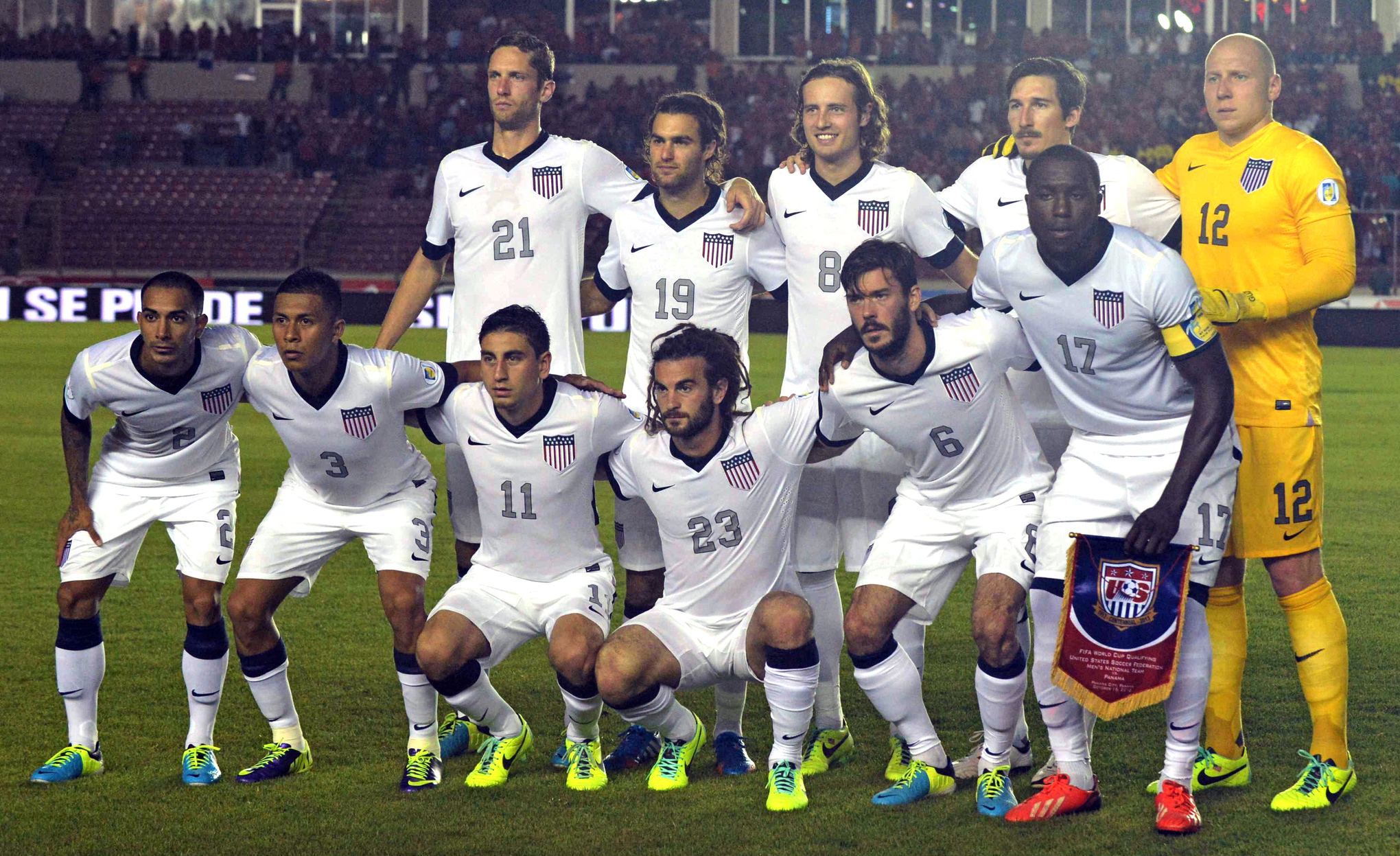
The US men's national team poses before an October 23 match against Panama. RODRIGO ARANGUA/AFP/Getty Images
Every World Cup, there are unusually strong groups stocked with solid teams, nicknamed the "groups of death." Coming into the tournament this year, many felt Group G — which featured the US, Germany, Portugal, and Ghana — was it.
But the US team's dramatic victory in game 1 against Ghana, paired with a draw against Portugal, gave them just enough points to make it out of Group G, and make it into the knockout stage for the second straight World Cup.
Unlike in many other team sports, the US team has never been a world soccer power, and only has a single knockout round win since 1930. They'll face a tough test right off the bat, likely playing Belgium in their next match, on July 1. The last time the two teams met, Belgium won 4-2.
4. Brazil, Argentina, and Germany are three of the favorites

Neymar, Brazil's star forward, celebrates a goal. Dean Mouhtaropoulos/Getty Images
Coming into the World Cup, Spain — winner of the 2010 World Cup and FIFA's number one ranked team — was considered one of the teams likeliest to win this year. But the team has already been eliminated after upset losses to Chile and the Netherlands, changing the complexion of the tournament before the knockout rounds.
The current favorite is probably Brazil. The third-ranked team in the world coming in to the World Cup, Brazil is also enjoying the benefits of playing at home: the team hosting the tournament has won six of 19 World Cups, and has made it to the knockout stage every time except once. Brazil has also won five World Cups — more than any other country — and is looking to erase the disappointment of the last time the country hosted the tournament, in 1950, when the squad only needed a draw in the final against Uruguay to win the title, but lost.
Other strong contenders include Argentina — a team that features forward Lionel Messi, one of the world's top goal scorers, and has already clinched a spot in the knockout stage after wins over Bosnia and Iran — and Germany, who was ranked second in the world heading in to the tournament.
Note: This article, originally written before the World Cup, first named Brazil and Spain as the favorites. It's since been updated.
5. Soccer is a complex game
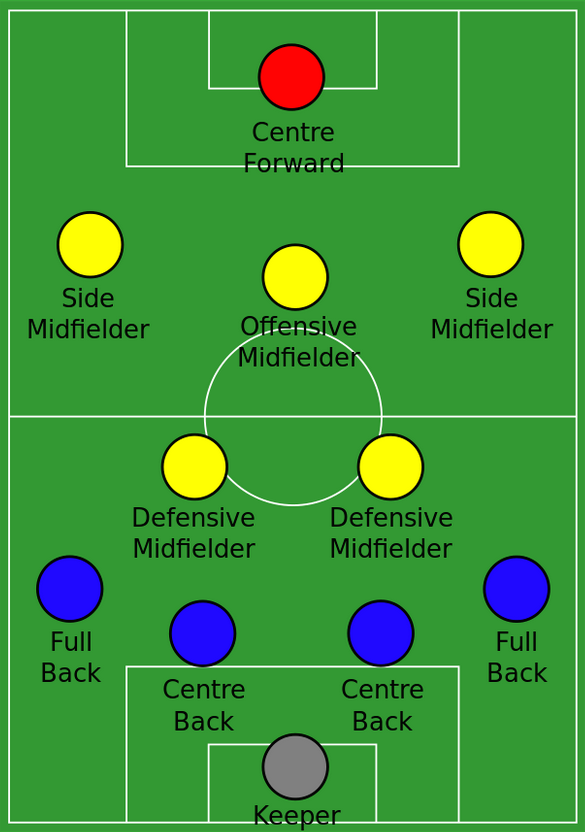
The 4-2-3-1 formation, increasingly popular in recent years. Wikimedia commons
To a casual viewer, soccer might seem pretty straightforward: you have two teams of eleven players on a field (called a pitch), both trying to put a spherical ball into the other team's goal. They can use any part of their body besides their arms or hands to do so, except the goalie (called a keeper), who can use his hands as long as he's within a box in front of his own net.
The nuances of the game, though, are more complicated than you might expect. Among the important rules to know:
- An offensive player is offside if he is in the attacking half of the field, doesn't have the ball, and goes behind the second-farthest back defender (including the keeper). If this player gets involved in the play — say, by being passed the ball — it's a violation, and the other teams gets a free kick. This complex rule is intended to prevent offensive players from just sitting by the net, waiting for the ball.
- A yellow card is shown to a player after he commits a misconduct, a type of foul. If he commits a second misconduct, a red card is shown, and he's ejected — forcing his team to play one man down for the rest of the match.
- A throw-in occurs when the ball is kicked out of bounds along one of the side lines. When it goes out the end line, a goal kick occurs if it was last touched by an offensive player, and a corner kick occurs if it was last touched by a defensive player or the keeper.
- The match lasts 90 minutes (with two 45-minute halves), and the clock never stops. Not for goals, injuries, or any time-outs. Instead, referees add stoppage time to the end of the match to cover the time used up on substitutions and goal celebrations.
- Each team is allowed three substitutions over the course of a match. For the World Cup, rosters are limited to 23 players: 11 starters and 12 subs.
A team is made up of ten defenders, midfielders, and forwards — with varying numbers of each for strategic reasons — plus one keeper. Different coaches use all sorts of different numbers and formations of the first three: currently, the 4-2-3-1 formation (four defenders, two defensive midfielders, three attacking midfielders, and a forward) is especially popular.
But apart from their formations, teams have radically different strategies and styles. Germany has long been known for organization and efficiency, Spain makes many short, high-percentage passes, Argentina has an explosive offense led by Lionel Messi, and Brazil uses speed to press aggressively. Like any sport, the strategy of soccer goes very deep.
6. There are millions of dollars at stake
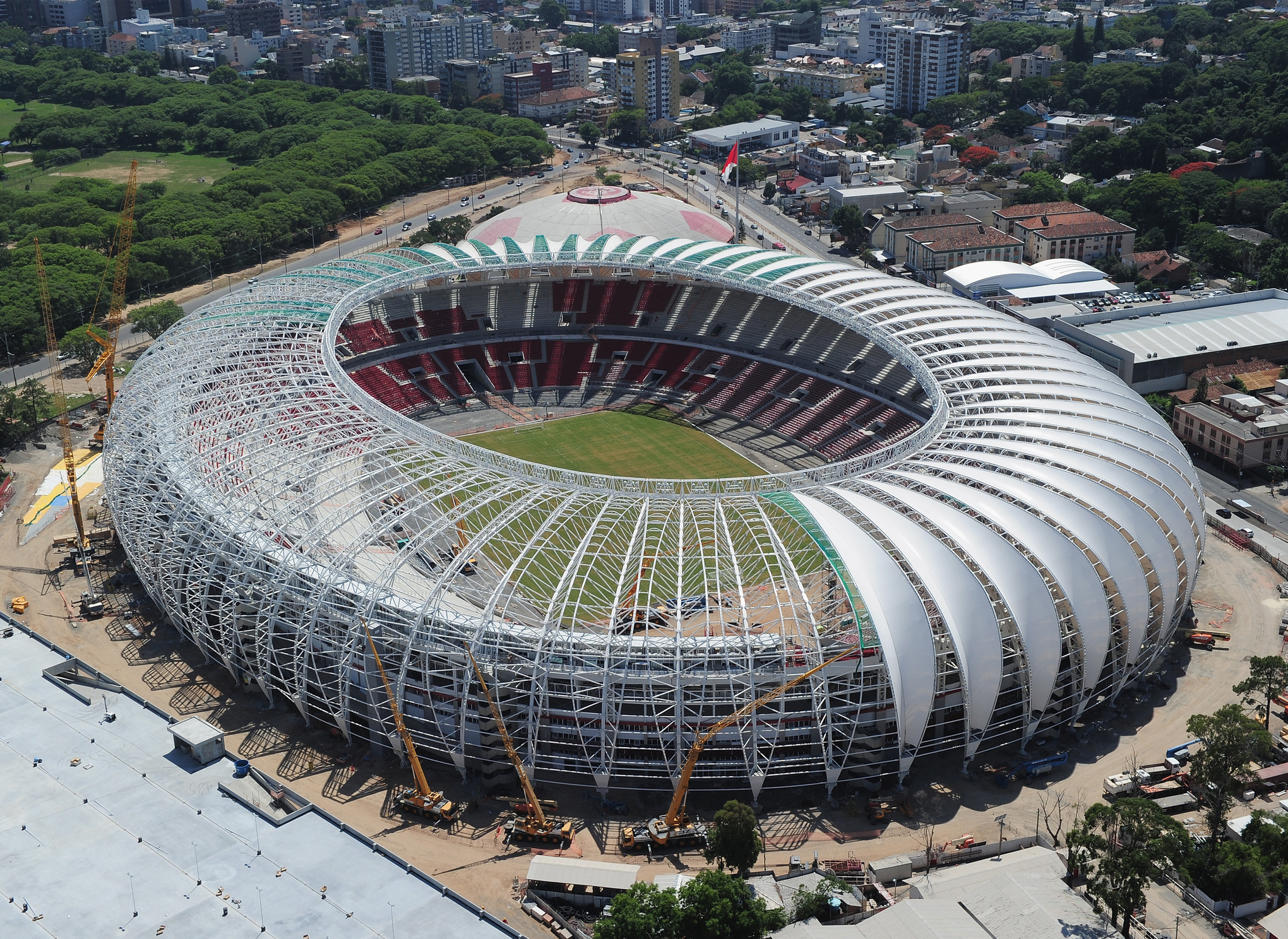
Beira Rio stadium, in Porto Alegre, one of seven new or heavily refurbished stadiums built for the World Cup. Shaun Botterill/Getty Images
To an American, this whole tournament seems pretty Olympic-esque. So it might come as a surprise that there are actually payouts given to winning teams: FIFA gives out a total of $576 million, with $35 million going to the champions, $25 million to the runners up, and various amounts to every other team down to $8 million for those eliminated in the group stage.
FIFA IS PROJECTED TO TAKE IN $4 BILLION
Like the Olympics, though, the organizing group rakes in most of the money. Though FIFA is spending an estimated $2 billion on the event, they're projected to take in a record $4 billion from ticket sales, corporate sponsorships, and other revenue streams.
These profits are related to the culture of corruption within FIFA, which has been getting attention from everyone from the New York Times to John Oliver in recent days. Part of the problem is the secret vote used to award World Cup sites, which allegedly led to Qatari officials paying multimillion-dollar bribes to FIFA in exchange for the 2022 World Cup. That scandal doesn't directly involve this year's World Cup, but it's added to the aura of corruption surrounding FIFA and casts a shadow over the event.
7. Many Brazilians are protesting the World Cup
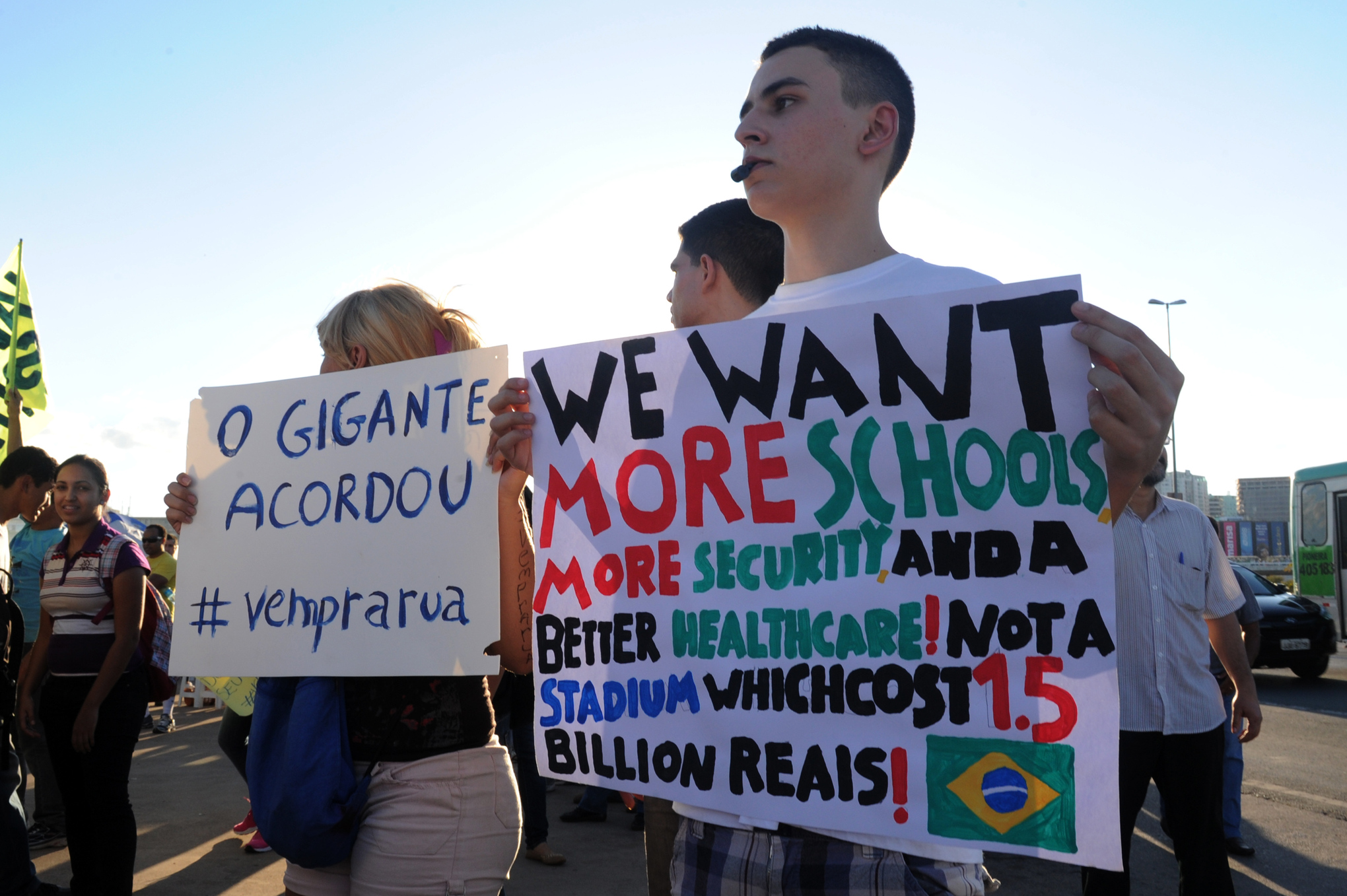
Students protest in Brasilia. EVARISTO SA/AFP/Getty Images
Brazil absolutely loves soccer. But the Brazilian government has spent an estimated $14 billion preparing for the tournament, building seven gleaming new or fully refurbished stadiums around the country, and upgrading airports, roads, and light rail systems. It is paying $900 million for security forces alone.
GIVEN THAT NEARLY 16 PERCENT OF THE COUNTRY LIVES BELOW THE POVERTY LINE, MANY BRAZILIANS ARE PROTESTING THE $14 BILLION SPENT ON THE WORLD CUP
At the same time, nearly 16 percent of the country lives below the poverty line, basic infrastructure like sewer lines and sidewalks aren't available to many people, and economic growth has slowed in recent years. That's why many Brazilians are questioning these investments — especially given FIFA's projected profits from the event. In a recent poll, 61 percent of Brazilians said hosting the event was bad for the country's economy.
Additionally, nine construction workers died during the course of building the stadiums, and about 250,000 people have been displaced from urban favelas during the lead-up to the event. Making matters worse is the fact that Rio de Janeiro is also hosting the 2016 Olympics, which will involve further construction of lavish facilities for elites and foreign athletes.
Consequently, protests, strikes, and riots have erupted in many corners of Brazil as the event draws near. Most recently, a subway strike in São Paulo has disrupted transportation in the mega city and threatened instability with matches just a few days away.
8. The matches are spread thousands of miles apart
You might imagine the World Cup to be a geographically compact event, like the Olympics. But the 12 stadiums are spread widely across Brazil, a country nearly as large as the US.
As a result, the tournament will entail long-distance travel for the teams. From the US team's first match, in Natal, they'll fly about 1,700 miles to Manaus, for their second match.
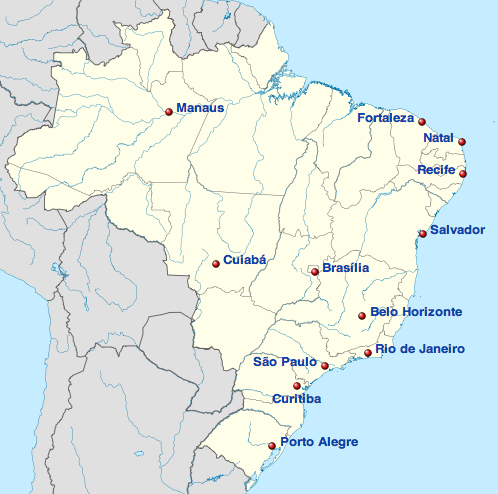
The 12 sites of the 2014 World Cup. Wikimedia commons
This is the second World Cup to be hosted in Brazil, and the stadiums are spread more evenly than in 1950, with more northern and inland sites involved.
In between matches, teams will stay at self-selected base camps. The vast majority are staying at either Rio de Janeiro or São Paulo, with the US at the latter.
9. Many teams ban their players from having sex during the World Cup
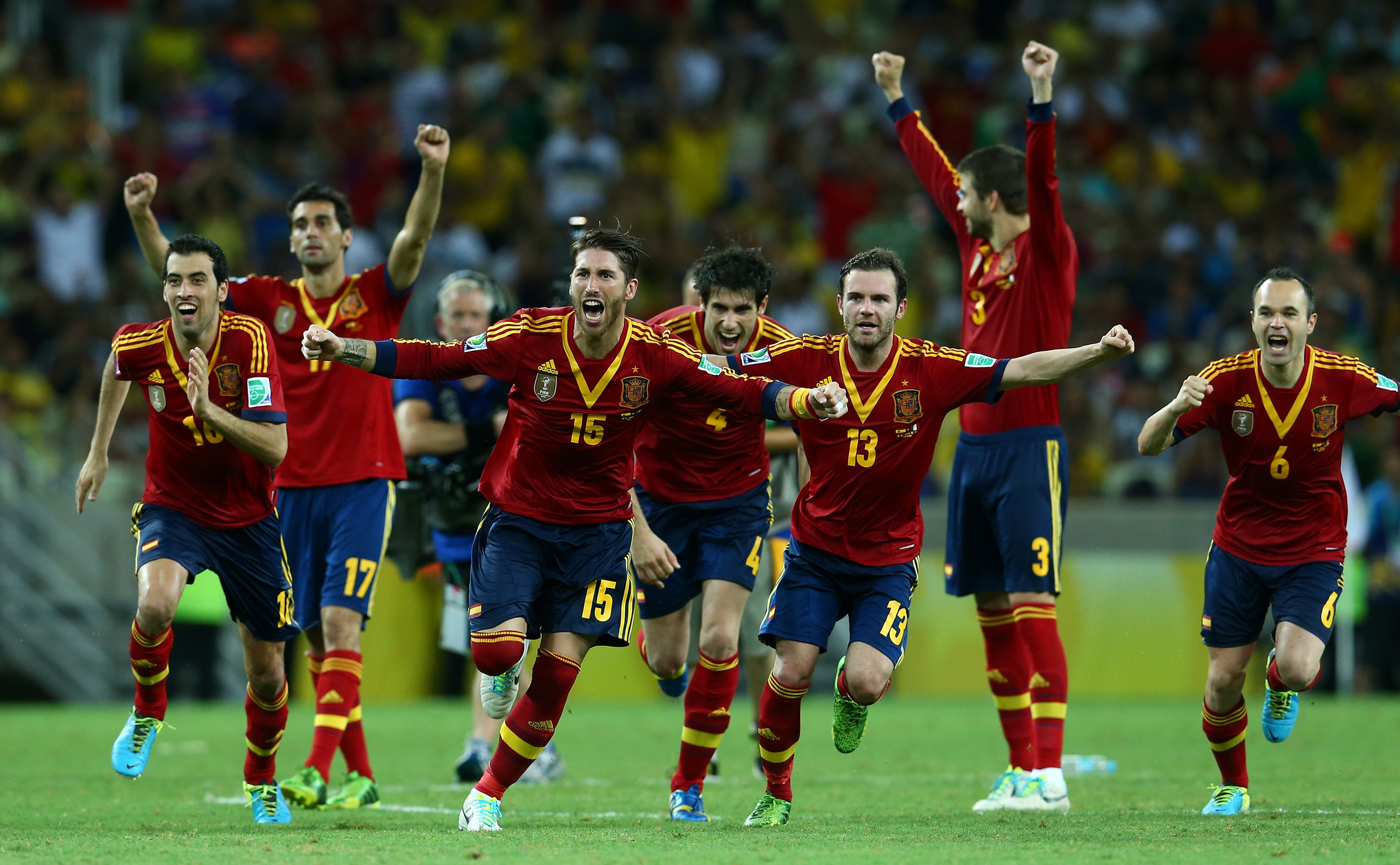
The Spain team celebrates a 2013 win, perhaps a result of abstinence during tournament play. Robert Cianflone/Getty Images
Among the stranger things to know about the event: some coaches restrict their players' sex lives during the month of play due to the belief that excessive sex will impede their performance on the field.
Players on Spain, Germany, Chile's teams aren't allowed to have sex at all, while Brazil's players are permitted to have "normal sex" as long as it's not "acrobatic," and France's are also allowed to have sex as long as it doesn't last all night.
10. You can watch on the matches on ESPN and Univision
In the US, the 64 matches will be split between ESPN (43 matches), ESPN2 (10 matches) and its parent network ABC (10 matches). ESPN will also make every game available through its WatchESPN website and apps, but you need to be a subscriber to one of 14 cable companies access them. You can find the full listings here.
However, if you don't pay for cable but still want to watch, the matches will also be broadcast in Spanish on Univision and streamed online. Quartz has a nice list of other options for figuring out how to watch for free online.

No comments:
Post a Comment